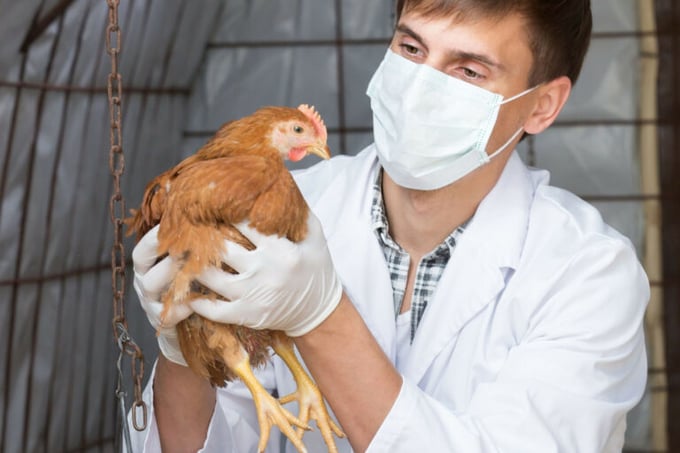May 21, 2025 | 09:04 GMT +7
May 21, 2025 | 09:04 GMT +7
Hotline: 0913.378.918
May 21, 2025 | 09:04 GMT +7
Hotline: 0913.378.918

Several poultry companies have noted that the issue of vaccine shortages is gradually becoming more pressing. Photo: Canva.
Russian poultry farmers are largely concerned over the narrowing flow of imported veterinary pharmaceuticals, the local branch of Forbes reported. Russia is self-sufficient in poultry vaccines by only 30%, the Agricultural Ministry estimated. By 2030, the Ministry expects this figure to grow to about 47%, though this will require substantial investments.
In total, 297 imported and 319 domestic veterinary vaccines are registered in Russia, of which 117 and 73, respectively, are used for poultry farming, estimated Eduard Mailyan, an independent poultry industry analyst. Out of the 50 most popular types of vaccines in poultry farming, local firms fully meet the industry’s demand only for 11, he said.
Russian veterinary pharmaceutical imports are in jeopardy, as from 1 September, a new procedure for getting a greenlight for imports from the Russian regulator is due to come into force.
“The new rules, in fact, obligated all foreign manufacturers of immunobiological products to undergo certification for compliance with Russian rules of good manufacturing practice, or GMP, and provide their vaccine strains for deposit in Russia,” Mailyan noted. “And for some, providing a strain is tantamount to disclosing a trade secret, since, after transferring the material, the vaccine can begin to be produced without the company’s involvement.”
Some of the world’s largest vaccine suppliers have left the Russian market under the sanction pressure. For example, Mailyan listed Intervet/MSD, Zoetis, Boehringer Ingelheim/Merial, Elanco/LAH/Avipro among those that pulled out from the country.
For those that remain on the market, sanctions have made imports more challenging. For example, Hipra and CevaSantéAnimale reportedly experience difficulties in importing vaccines, the analyst added.
There is already a shortage of effective vaccines, which could lead to a decrease in production effectiveness in the poultry sector, warned Mailyan. For example, poultry farms are beginning to experience a shortage of vaccines against Newcastle disease. This shortage could potentially lead to a rise in disease outbreaks, increased mortality rates, and a decline in poultry production, all of which would have a significant economic impact on the sector.
“The availability of imported vaccines has greatly decreased, and domestic suppliers, unfortunately, cannot keep up with the growing demand for their products due to limited production capacity,” te Cherkizovo press office commented.
Several poultry companies told Forbes that the issue of vaccine shortages is gradually becoming more pressing. To plug the gap, Russian poultry farmers import vaccines via parallel imports through third countries. However, in this case, the issue of vaccine safety comes to the fore, as grey schemes are less reliable than official channels, Forbes reported.
(Poultryworld)

(VAN) Attempts to bring down the price of the Japanese staple have had little effect amid a cost-of-living crisis.

(VAN) Fourth most important food crop in peril as Latin America and Caribbean suffer from slow-onset climate disaster.

(VAN) Shifting market dynamics and the noise around new legislation has propelled Trouw Nutrition’s research around early life nutrition in poultry. Today, it continues to be a key area of research.

(VAN) India is concerned about its food security and the livelihoods of its farmers if more US food imports are allowed.

(VAN) FAO's Director-General emphasises the need to work together to transform agrifood systems.

(VAN) Europe is facing its worst outbreak of foot-and-mouth since the start of the century.

(VAN) The central authorities, in early April, released a 10-year plan for rural vitalization.